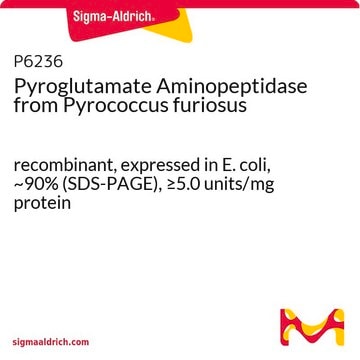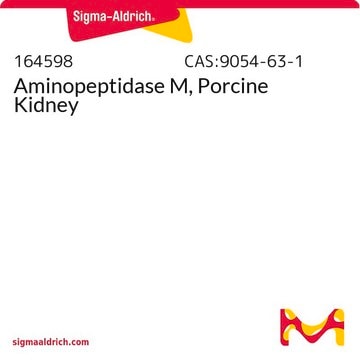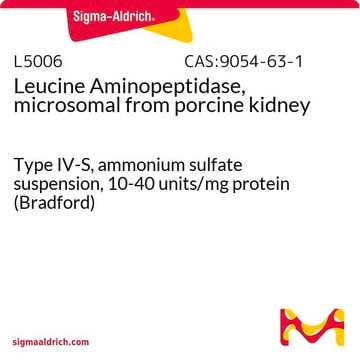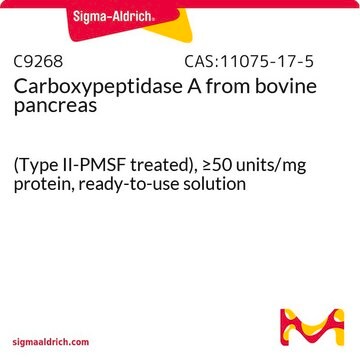M6435
Methionine Aminopeptidase from Pyrococcus furiosus
≥93% (SDS-PAGE), recombinant, expressed in E. coli
Iniciar sesiónpara Ver la Fijación de precios por contrato y de la organización
About This Item
MDL number:
UNSPSC Code:
12352204
NACRES:
NA.54
Productos recomendados
recombinant
expressed in E. coli
Quality Level
assay
≥93% (SDS-PAGE)
form
solution
specific activity
0.5 units/mg protein
mol wt
37 kDa by SDS-PAGE
UniProt accession no.
foreign activity
Other proteases, none detected
shipped in
dry ice
storage temp.
−20°C
Gene Information
Pyrococcus furiosus DSM 3638 ... PF0541(1468383)
General description
Methionine aminopeptidase from Pyrococcus furiosus is a 32 kDa thermostable enzyme. It belongs to type 2a class of methionine aminopeptidase. Methionine aminopeptidase maintains protein homeostasis and coordinates posttranslational modification of proteins in eukaryotes.
X-ray crystallography of the structure of methionine aminopeptidase from Pyrococcus furiosus or PfMAP was performed at a resolution of 1.75A and showed that the protein consists of a catalytic domain containing two cobalt ions in the active site and a unique insertion domain which is specific to the prokaryotic form of the protein.
Application
Methionine Aminopeptidase from Pyrococcus furiosus has been used in a study to analyze the binding of Co(II)-specific inhibitors to the methionyl aminopeptidases from Escherichia coli and Pyrococcus furiosus. It has also been used in a study to examine the binding of a new class of pseudopeptide analog inhibitors.
Biochem/physiol Actions
Thermostable methionine aminopeptidase, which specifically liberates the N-terminal methioinine from proteins and peptides.
Unit Definition
One unit will hydrolyze 1 μmol of Met from Met-Pro-Ala-Ala-Gly in 1 minute at pH 7.5 at 37 °C.
Physical form
Solution containing 0.01% Tween® 20, 0.1 mM CoCl2, and 10 mM Tris-HCl, pH 7.5.
Legal Information
TWEEN is a registered trademark of Croda International PLC
Storage Class
12 - Non Combustible Liquids
wgk_germany
WGK 2
flash_point_f
Not applicable
flash_point_c
Not applicable
Certificados de análisis (COA)
Busque Certificados de análisis (COA) introduciendo el número de lote del producto. Los números de lote se encuentran en la etiqueta del producto después de las palabras «Lot» o «Batch»
¿Ya tiene este producto?
Encuentre la documentación para los productos que ha comprado recientemente en la Biblioteca de documentos.
Methionine aminopeptidase from the hyperthermophilic Archaeon Pyrococcus furiosus: molecular cloning and overexperssion in Escherichia coli of the gene, and characteristics of the enzyme
Tsunasawa S, et al.
Journal of Biochemistry, 122(4), 843-850 (1997)
Advances in bacterial methionine aminopeptidase inhibition
Helgren TR, et al.
Current Topics in Medicinal Chemistry, 16(4), 397-414 (2016)
R A Bradshaw et al.
Trends in biochemical sciences, 23(7), 263-267 (1998-08-11)
Removal of the initiator methionine and/or acetylation of the alpha-amino group are among the earliest possible chemical modifications that occur during protein synthesis in eukaryotes. These events are catalyzed by methionine aminopeptidase and N alpha-acetyltransferase, respectively. Recent advances in the
Sanghamitra Mitra et al.
Journal of biological inorganic chemistry : JBIC : a publication of the Society of Biological Inorganic Chemistry, 14(4), 573-585 (2009-02-10)
Methionine aminopeptidases (MetAPs) represent a unique class of protease that is capable of the hydrolytic removal of an N-terminal methionine residue from nascent polypeptide chains. MetAPs are physiologically important enzymes; hence, there is considerable interest in developing inhibitors that can
A Ben-Bassat et al.
Journal of bacteriology, 169(2), 751-757 (1987-02-01)
Methionine aminopeptidase (MAP) catalyzes the removal of amino-terminal methionine from proteins. The Escherichia coli map gene encoding this enzyme was cloned; it consists of 264 codons and encodes a monomeric enzyme of 29,333 daltons. In vitro analyses with purified enzyme
Nuestro equipo de científicos tiene experiencia en todas las áreas de investigación: Ciencias de la vida, Ciencia de los materiales, Síntesis química, Cromatografía, Analítica y muchas otras.
Póngase en contacto con el Servicio técnico